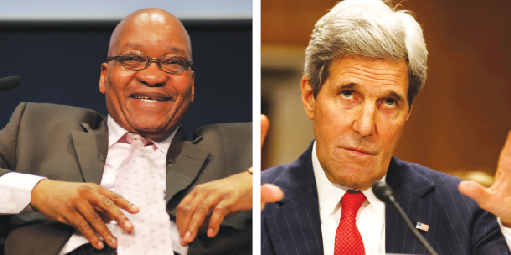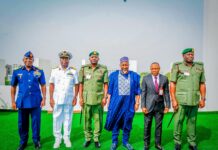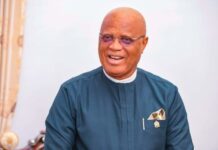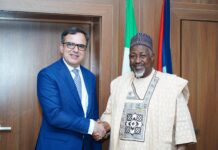For a robust relationship with the international community, stakeholders and experts make recommendation on foreign policy for the in-coming Buhari federal government, writes Correspondent, SAM NWOKORO.
There have been a swelter of issues in the administration of institutions managing Nigeria’s foreign relations. There is the perception that Nigerian state managers have not kept pace with the dynamics of contemporary international politics. The country is yet to identify strategic power blocs in the world on which to focus her foreign policy engagement over a longer period and sustainable basis. She seems to be concentrated on mopping in foreign direct investments (FDIs) from as many places as she could muster the leeway.
From Africa to Asia, to North America, to Europe and South Asia, the general belief is that Nigeria is yet to formulate a long term foreign policy package to guide her, irrespective of whichever political party’s programme or ideology is incumbent in relating to all these regional power blocs. For now, it seems African Union (AU) and ECOWAS still remain in constant focus. Nigeria still tags behind South Africa in terms of industrialisation, technology and productivity despite renowned superiority of Nigeria in terms of human and capital resources.
Most scholars of international affairs believe that Nigeria ought to be more visible on the international stage than South Africa. Nigeria’s Ministry of Foreign Affairs, even despite its modest innovations in foreign diplomacy, still has problems which people complain about. There are complaints that its bureaucracy is no longer in tandem with contemporary dynamics in international relations.
Though the outgoing government tried to properly engage the world at various levels, in bilateral and multilateral platforms, the craving for foreign capital through FDI from anywhere in the world overshadowed the imperative of relating to power centres of the world in a coordinated enduring pattern that can exist government after government. These and their associated problems plus other sour areas in Nigeria’s foreign policy activities are hereby itemised for the incoming government. These grey areas identified are gathered from opinions of experts and stakeholders.
Plight of Diaspora Nigerians
The issue of maltreatment of Nigerians by foreigners has in recent time become a worrisome issue. In the past couple of years, no single day passes by without one unsavoury story or another about groups of Nigerians suffering for sundry reasons. It is estimated that about 50,000 Nigerians are scattered in various prisons abroad as at November 2014.
Recently, some four Nigerians were executed in Indonesia for drug trafficking and about eight others reportedly in death row, though the United Nations have urged nations to abolish all forms of capital punishment on charges not proven to be murder case. Despite concerted efforts by well-meaning world figures and Nigerian authorities to secure the freedom of the convicts, the Indonesian authorities still went ahead to execute them. Yet, just two days after the execution, some top officials of Ministry of Foreign Affairs went all the way from Abuja to Indonesian Consulate in Lagos partying at the premises of the consulate where Nigeria’s pleas for clemency of the drug convicts were thrown into the trash can.
An agitated Geoffrey Nwagwu, a respondent in Lagos who read about the execution and the partying splashed side by side in one edition of a national daily fumed: “This is sordid. It portrays our public officers as animals who have no moral compulsion. Even if these Nigerians fall foul of the laws of Indonesia and the country turned down our pleas for their pardon, must we demean our reputation further by partying in the Indonesian consulate just two days after the execution of our children?”
This is perhaps where the Buhari regime would have to begin the campaign at sanitising Nigeria’s relationship with the outside world. By all accounts and public testimonials, the Ministry of Foreign Affairs needs total cleansing to key it into the governments efforts at global engagement.
Purging Ministry of Foreign Affairs
There have been many reported shortcomings from the ministry. There have been complaints of unqualified staff who do not even understand the foreign policy focus of the government they work for, much more the external partners government deals with day by day. In a publication recently in NigerianWorld, Dr. Adebimpe Onifade, a Nigerian international relations researcher, regretted the absence of adequate information about the programmes and activities of the Ministry of foreign Affairs. This, he said, shows that the officials of the ministry seem not abreast with the happenings in the world as they affect Nigeria’s foreign policies.
He decried a situation whereby the ministry’s website is without any worthwhile information any foreigner or investor in Nigeria can rely on as a guide.
“US National Intelligence Council not long ago reported about Nigeria’s internal security and the risk foreigners face, and curiously, no single reply from the Ministry of Foreign Affairs,” he said.
According to the don, there is need for the incoming administration to shop for tested technocrats to be appointed as ambassadors, rather than go after the civil servants in the ministry who are not responsive enough to issues affecting Nigeria.
Xenophobia
Recently at a forum, the Nigerian-South African Chamber of Commerce, following the xenophobic attacks on non-natives, bemoaned the seemingly poor Nigeria-South Africa relations. The latest was not the first time the country had embarrassed Nigeria on flimsy excuses, despite Nigeria’s goodwill in the country’s struggle against apartheid. Recently, some Nigerians were deported from the Rainbow country on trumped up charges of not having yellow fever vaccination card, a claim later discovered to be untrue. Again, most Nigerians have fallen victim of South Africa’s xenophobia.
However, some observers have noted that, notwithstanding the attacks, South Africa provided Nigerian military forces fighting Boko Haram insurgency in the North East vital military intelligence as hired mercenaries, and that while a building owned by a local church in Nigeria collapsed and killed about 80 South Africans, Jacob Zuma’s country did not go to court, rather co-operated in carrying their dead compatriots in reverence to Nigerian laws.
On another vein, Nigeria and South Africa subtly compete for global relevance and recognition, as the selection of a permanent representative to the United Nations Security Council from Africa nears. Relations had since been pesky since both Nigeria and South Africa jostled for influence on who sits as current AU chairman. Nigeria lost her bid to enthrone Gabonese president while South Africa had its way. Thus it can safely be said that Nigeria-South Africa relations is a bit more cordial and a bit lukewarm, with mutual suspicion backgrounding it. This, to most observers, calls for tact and not necessarily tit-for-tat.
The two countries have been acknowledged globally as the two leaders capable of rewriting the history of Africa, given the size and fundamental indicators of their economy floating on a stable democracy.
Playing in global arena
The presence of a country’s national in the policy making processes of international organisations go a long way in uplifting the profile of that country. Besides, according to a foreign affairs expert, Professor Bola Akinterinwa, “they afford the country opportunity to monitor how some protocols and conventions made at international platforms affect her domestic policies”.
For Nigeria’s immediate past late Foreign Affairs Minister, Professor Olugbenga Ashiru, “the current administration secured 12 positions in the international organisations and launched an annual report of the activities of the ministry”. Though he did not give a breakdown of the positions, he confessed that neighbouring South Africa has garnered more international representation than Nigeria. This is another aspect the incoming administration is being advised by experts to make Nigeria’s presence felt. The opinion is that Nigeria has embraced free market and needs to make more friends than enemies and be more visible in the international fora.
Terrorism, climate, trafficking
A most recent study conducted by London-based Institute for Economics and Peace has ranked Pakistan third on global terror index (GTI) list. This was followed by Iraq, while Nigeria followed fourth along with Syria, according to the 2014 report. This, according to observers, shows that Nigeria is still plagued by terror attacks, in the political, sectarian and social spheres. Notwithstanding the modest successes recorded in routing insurgents operating in the North East, there is evidence that security of lives and property in Nigeria is still a tall order.
The incoming administration has been advised to regard the issues of terrorism, migration, human trafficking and drug ferrying as still unfinished jobs that require non-stop prosecution to sustain favourable perception about Nigeria, especially himself who won election on the strength that he is the one capable of making Nigerians safe.
National Intelligence Council (NIC), a body that monitors United States foreign policy engagement, recently gave a damning security profile of the country since her return to democracy: “Crime is a risk throughout the country. U.S. citizens, visitors and residents have experienced armed mugging, burglaries, car-jacking, rapes, kidnapping and extortion. Home invasion also remains a serious threat, with armed robbers accessing even guarded compounds by scaling perimeter walls, following residents or visitors, or subduing guards to gain entry to homes or apartments. Armed robbers in Lagos have also accessed water fronts compounds by boats. U.S. citizens as well as Nigerians and other expatriates have been victims of armed robbery at banks and grocery stores, and on airport roads during both daylight and evening hours. Law enforcement authorities usually respond slowly or not at all, and provide little or no investigation.”
Certainly, reports such as these do not provide confidence to foreigners.
Nigeria-U.S. relations
Nigeria’s relations with Washington has endured. And Big Sam played prominent role in ensuring the election which produced Muhammadu Buhari took place in an atmosphere that tended to snub any likelihood of any group or even the outgoing government contending its outcome.
It is the view of diplomatic observers that the Buhari government should try everything possible to amend whatever is the sour point of Nigeria-Washington relations. The issue of military co-operation with Washington in the fight against terrorism in Nigeria ruptured interaction between Nigeria and Washington before the elections, though it did not affect in any fundamental way Nigeria’s regard for Washington.
Buhari is a beneficiary of Washington’s consistent effort to enshrine real democracy in Nigeria become; thus, Washington expects his government to reciprocate this gesture by conducting governance in line with democratic norms and international conventions involving Nigeria and Washington.
A Nigerian expert on international relations Dr. Adebimpe Onifade posited thus: “The reality of the first decade of the 21st century is that there is only one super power in military and economic terms, and that is the U.S. Therefore, it would be foolhardy and shortsightedness for any country of Nigeria’s status to be at variance with the U.S. Many people have likened Nigeria to U.S. of Africa in many respects. It goes without saying too that the U.S. fully understands the status and potentials of Nigerian Africa and in the black world.”
He suggested, if possible, the establishment of Nigeria-America Public Affairs Council as a standby quasi-governmental body to effectively manage Nigeria-U.S. relations at a broader public and private domain as the Israeli-American Public Affairs Council (IAPAC) in Washington. Perhaps, this thinking is confirmed by the fact that the U.S. Secretary of State, John Kerry, will be be leading a high-powered delegation to attend the Buhari inauguration on May 29.
EU bloc
Experts are of the view that Nigeria’s relation with the United Kingdom should, by now, begin to veer more towards the European Union (EU) as a whole. Hitherto, Nigeria has tended to focus on Britain alone as the dominant power in Europe. They contend that some countries such as France, Germany and even Russia have become regional power centres in Europe that no longer bother much about British views when Eurocentric interest is discussed in Brussels. Germany and France have since overtaken Britain in economic and military might. So there is the suggestion in diplomatic circles that the incoming government of Nigeria will optimally benefit by having a multi-faceted foreign policy addressed differently to EU as a whole.
Relations with Asian Tigers
Malaysia, Taiwan, Singapore, South Korea, Hong Kong and Indonesia have emerged in world stage as regional economic powerhouses whose model of economic development Nigeria is following. This impels the incoming administration, according to Onifade, to consolidate relations with these nations.
“An articulate foreign policy with clear trade missions and organised domestic chamber of commerce and efficient banking system will certainly benefit any bilateral agreement with the Asian economies,” he added.















